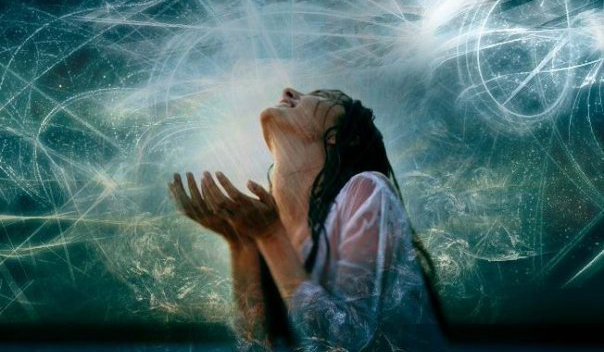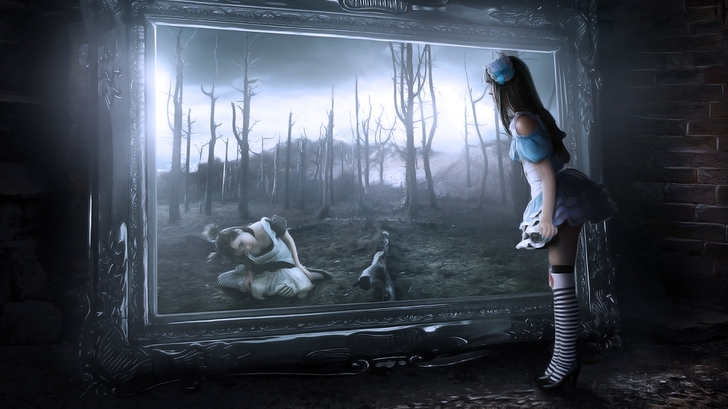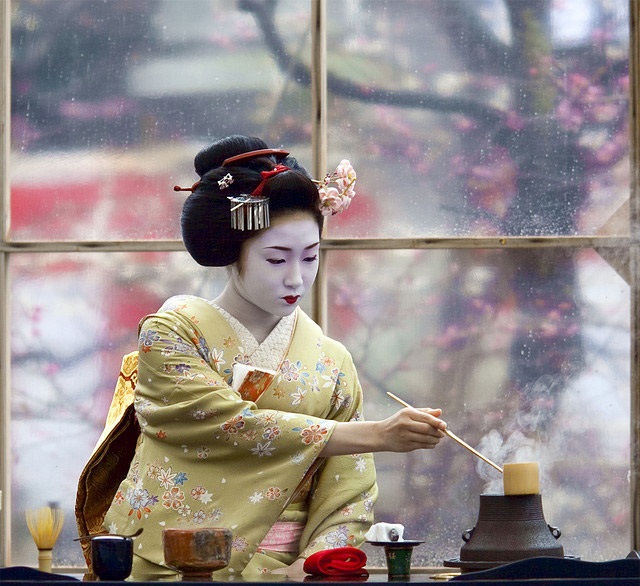Supernatural Powers & Abilities List
 Do you feel like you are special?
Do you feel like you are special?- Do you wonder if you have some special hidden power or ability that others' don't?
- Do you know who's on the phone before you pick it up (without looking at caller ID)?
- Do you fantasize about flying or deep sea diving without equipment?
- Can you see into others' hearts or minds?
Each and every one of us are born with something quite unique and special. It is our quest to discover our hidden gifts and talents. Following is a growing list of supernatural and supranatural powers and abilities. You may finally get some answers to the mystery of your own gifts.
ALSO SEE: Supernatural & Paranormal Glossary of Terms
List of 30 Supernatural Powers & Abilities Humans Can Develop
Astral ProjectionAstral projection is the ability to spiritually separate from your body and travel vast distances with the mind alone. It differs from bilocation in that the second body is a spirit body. The concept of astral projection has been familiar for thousands of years, dating back to ancient China and other ancient cultures. A great deal of skepticism exists around this ability due to the fact that the only evidence is the word of the person claiming to be able to project. A study done by Dr. Charles Tart tentatively concluded that astral projection may have objective validity. For example, in a 1967 study, a subject was not able to discover a five digit number written down and placed face up in an adjoining room, but did provide some details of the activities of the technician monitoring the experiment. Tart summarizes, “Thus, there is some indication that ESP may have been involved with respect to the technician’s activities, but it is not at all conclusive.”
Aura ReadingIn parapsychology and many forms of spiritual practice, an aura is a field of subtle, luminous radiation surrounding a person or object (like the halo or aureola in religious art). The depiction of such an aura often connotes a person of particular power or holiness. Sometimes, however, it is said that all living things (including humans) and all objects manifest such an aura. Often it is held to be perceptible, whether spontaneously or with practice: such perception is at times linked with the third eye of Indian spirituality. Various writers associate various personality traits with the colors of different layers of the aura. It has also been described as a map of the thoughts and feelings surrounding a person. In the ever growing case of 'mortal vampyres', the psi-vampyres claim to get energy from someone else's aura.BilocationBilocation is the alleged ability to be in two places at the same time. St Pio of Pietrelcina, the famous stigmatic, was said to have this ability. It is said to be a physical, rather than spiritual ability, which makes it different from astral projection. Friends of Aliester Crowley, the occultist, claimed that he had this ability, though in situations were he was meant to have bilocated, he was unaware of it. Although it is uncommon, bilocation is an ancient phenomenon. It is claimed to have been experienced, and even practiced by will, by mystics, ecstatics, saints, monks, holy persons, and magical adepts. This is also normally the explanation given for the tales of people appearing to loved ones just prior to their death.Clairvoyance (Vision)The power of Clairvoyance is the ability to see the unknown. The term clairvoyance (from French clair meaning "clear" and voyance meaning "vision") is used to refer to the ability to gain information about an object, person, location or physical event through means other than the known senses,i.e., a form of extrasensory perception. A person said to have the ability of clairvoyance is referred to as a clairvoyant ("one who sees clearly"). Clairaudience (Hearing)The ability to internally hear information that is passed from the dead. A very famous clairaudient was Doris Stokes, a British spiritualist. In the field of parapsychology, clairaudience [from late 17th century French clair (clear) and audience (hearing)] is a form of extra-sensory perception wherein a person acquires information by paranormal auditory means. It is often considered to be a form of clairvoyance. Clairaudience is essentially the ability to hear in a paranormal manner, as opposed to paranormal seeing (clairvoyance) and feeling (clairsentience). Clairaudient people have psi-mediated hearing. Clairaudience may refer not to actual perception of sound, but may instead indicate impressions of the "inner mental ear" similar to the way many people think words without having auditory impressions. But it may also refer to actual perception of sounds such as voices, tones, or noises which are not apparent to other humans or to recording equipment. For instance, a clairaudient person might claim to hear the voices or thoughts of the spirits of persons who are deceased. In Buddhism, it is believed that those who have extensively practiced Buddhist meditation and have reached a higher level of consciousness can activate their "third ear" and hear the music of the spheres; i.e. the music of the celestial gandharvas. Clairaudience may be positively distinguished from the voices heard by the mentally ill when it reveals information unavailable to the clairaudient person by normal means (including cold reading or other magic tricks), and thus may be termed "psychic" or paranormal. Clairgustance (Tasting)In the field of parapsychology, clairgustance is defined as a form of extra-sensory perception that allegedly allows one to taste a substance without putting anything in one's mouth. It is claimed that those who possess this ability are able to perceive the essence of a substance from the spiritual or ethereal realms through taste.Control (Chronokenisis) TimeThe ability to Manipulate or Control Time is Chronokinesis which is the psychic ability to control one's perception of time and maybe time itself through the mind. It is done oftentimes through focused reduced brainwave patterning via deep meditation which can often involve astral projection.DivinationDivination (from Latin divinare “to foresee, to be inspired by a god”, related to divinus, divine) is the attempt to gain insight into a question or situation by way of an occultic, standardized process or ritual. Used in various forms throughout history, diviners ascertain their interpretations of how a querent should proceed by reading signs, events, or omens, or through alleged contact with a supernatural agency. Divination can be seen as a systematic method with which to organize what appear to be disjointed, random facets of existence such that they provide insight into a problem at hand. If a distinction is to be made between divination and fortune-telling, divination has a more formal or ritualistic element and often contains a more social character, usually in a religious context.EmpathEmpathy is the capacity to understand what another person is experiencing from within the other person's frame of reference, ie, the capacity to place oneself in another's shoes. As an empath you can acquire the deep emotions of another and oftentimes confuse them with your own. Empathy is always a choice. Energy (Psychic) VampireAn energy psychic vampire is a person or being who feeds off the "life force" of other living creatures. Psychic vampires are represented in the occult beliefs of various cultures and in fiction. There is no scientific or medical evidence supporting the existence of psychic vampires, or even the bodily or psychic energy they allegedly drain. You can feel the effects of an energy psychic vampire when you feel terribly exhausted after a meeting or conversation. [Read this Article for More Info] Enhanced (Clairaudience) Hearing/ListeningIn the field of parapsychology, clairaudience [from late 17th century French clair (clear) and audience (hearing)] is a form of extra-sensory perception wherein a person acquires information by paranormal auditory means. It is often considered to be a form of clairvoyance. Clairaudience is essentially the ability to hear in a paranormal manner, as opposed to paranormal seeing (clairvoyance) and feeling (clairsentience).Enhanced (Clairalience) SmellingAlso known as clairescence. In the field of parapsychology, clairalience (or alternatively, clairolfactance) [presumably from late 17th century French clair (clear) and alience (smelling)] is a form of extra-sensory perception wherein a person accesses psychic knowledge through the physical sense of smell. These appear in the form of phantom smells or etheric smells. Extra Sensory PerceptionExtra Sensory Perception, or ESP, is the ability to gather information without the use of the 5 senses (hence it is also sometimes called sixth sense). ESP is often tested with a deck of 25 cards called Zener cards. Familiar to most people, these cards comprise a deck of 5 patterns, a circle, a square, a triangle, a set of squiggly lines, and a plus. Two people participate; one views the cards one by one, and the other attempts to “see” the card with the power of the mind. Again, there is a 1 in five chance that you will guess the card correctly, so it is not a particularly useful method of proof. Of course your odds improve with every card produced if you are told whether your guess was correct, as you can use card counting. The cards are also used in tests of telepathy when the viewer does not just record the shape on the card for verification, but attempts to “transmit” the shape to the other person. On average, most people guess right about 20% of the time.GlamourizationMany, many people are equipped with the ability to glamourize others. It is a mild form of spell casting that so many are able to use to seduce another that they aren't aware of the power this ability holds over another. And it's all in the eyes! Glamour originally was a term applied to a magical-occult spell that was cast on somebody to make them see something the spell-caster wished them to see, when in fact it was not what it seemed to be. In the late 19th century terminology, a non-magical item used to help create a more attractive appearance gradually became known as 'a glamour'. Today, glamour is the impression of attraction or fascination that a particularly luxurious or elegant appearance creates, an impression which is better than the reality. Typically, a person, event, location, technology, or product such as a piece of clothing can be glamorous or add glamour. Virginia Postrel says that for glamour to be successful nearly always requires sprezzatura - an appearance of effortlessness, and to appear distant - transcending the everyday, to be slightly mysterious and somewhat idealised, but not to the extent it is no longer possible to identify with the person. Glamorous things are neither opaque, hiding all, nor transparent showing everything, but translucent, favourably showing things. The early Hollywood star system in particular specialised in Hollywood glamour where they systematically glamorised their actors and actresses. Glamour can be confused with a style, which is adherence to a particular school of fashion, or intrinsic beauty; whereas glamour can be external and deliberate.LevitationLevitation (from Latin levitas "lightness") is the process by which an object is held aloft, without mechanical support, in a stable position. Levitation is accomplished by providing an upward force that counteracts the downward force of gravity, plus a smaller stabilizing force that pushes the object toward a home position whenever it is a small distance away from that home position. The force can be a fundamental force such as magnetic or electrostatic, or it can be a reactive force such as optical, buoyant, aerodynamic, or hydrodynamic. Levitation excludes floating at the surface of a liquid because the liquid provides direct mechanical support. Levitation excludes hovering flight by insects, hummingbirds, helicopters, rockets, and balloons because the object provides its own counter-gravity force. Gurus and masters levitate during deep focused meditation.
PostcognitionPostcognition is the opposite of precognition; it is the ability to see an event after it has occurred. This is probably the most widely used ability in modern days as many police forces invite psychics to assist them on difficult unsolved cases. This ability has been yet another topic of a Stephen King novel, the Dead Zone, in which the main character is able to see bad aspects of a person’s past from touching them or an object belonging to them. While there has often been some success with postcognitive visions in criminal investigations, it is still generally considered to be the result of hoax or fraud perpetrated by a person who has done research in to the crime, enabling them to give broad enough description to seem legitimate. |
PrecognitionIn parapsychology, precognition (from the Latin præ-, "before" and cognitio, "acquiring knowledge"), also called future sight, and second sight, is a type of extrasensory perception that would involve the ability to see the future, acquisition or effect of future information that cannot be deduced from presently available and normally acquired sense-based information. The existence of precognition, as with other forms of extrasensory perception, is not accepted by the mainstream scientific community. Scientific investigation of extrasensory perception (ESP) is complicated by the definition which implies that the phenomena go against established principles of science. Specifically, precognition would violate the principle that an effect cannot occur before its cause. There are established biases affecting human memory and judgment of probability that create convincing but false impressions of precognition. PsychokinesisPsychokinesis is also known as Telekinesis and mind over matter, and it is the ability to move or manipulate objects with the mind. This, in combination with pyrokinesis is the ability that Carrie White had in the excellent book and movie adaptation of Stephen King’s Carrie. Of all the items in this list, I would say this is the one that most people would love to have. It would make the television remote defunct and we could basically sit on our butts all day long and do nothing! The position normally taken by scientists and skeptics is that any apparent evidence of this ability is the result of fraud. Many books claim to help you learn this ability and they often contain exercises to help. For example, you may be told to throw a dice repeatedly whilst trying to control the number that comes up. Unfortunately, this creates the psychological state of illusion of control, in which a person comes to believe they are influencing the dice, when in fact, on every roll they have a 1 in 6 chance that their number will come up. One famous person who claims to have this ability is Uri Gellar, who is well known for his spoon bending trick in which he would (apparently) gently rub a spoon just beneath the bowl and the spoon would twist or turn. In fact, skeptics have been able to mimic this trick with great success and no claim to having supernatural abilities. Psychometry (Touch-Know)Psychometry (Touch-Know) is the ability to “read” information or memories from objects or situations. For example, a psychometrist may hold a watch or wallet belonging to a person they do not know, and by concentrating on the object, garner information about the person’s past, present, or future. The concept of psychometry is a popular theme for stage act and Séance; with participants being asked to provide a personal object to be “read” by a medium or psychic. It was used as the basis for Johnny Smith’s visions in Stephen King’s 1979 novel The Dead Zone and its subsequent 2002 television adaption. As well as in Stephen King's film Rose Red where the character of Pam demonstrated this skill while touching the front door's handles and speaking in Sukeena's voice at the same time. PyrokinesisPyrokinesis is the ability to ignite or extinguish fires with the mind. In yet another book by Stephen King, Firestarter, the main character, a young girl, has this ability. There is no scientific evidence to suggest that this ability is real, though many people involved in the field of parapsychology believe it exists. There may be a connection between this alleged ability and the various reports of spontaneous human combustion. RegenerationRegeneration is renewal through the internal processes of a body or system. Something which embodies this action can be described as regenerative. Many titles of cultural work and cultural and scientific concepts use the term. Remote ViewingRemote viewing (RV) is the practice of seeking impressions about a distant or unseen target using subjective means, in particular, extrasensory perception (ESP) or "sensing with mind". There is no credible scientific evidence that remote viewing works, and the topic of remote viewing has been described as pseudoscience. Typically a remote viewer is expected to give information about an object, event, person or location that is hidden from physical view and separated at some distance. The term was coined in the 1970s by physicists Russell Targ and Harold Puthoff, parapsychology researchers at Stanford Research Institute (SRI), to distinguish it from clairvoyance. Remote viewing was popularized in the 1990s upon the declassification of certain documents related to the Stargate Project, a $20 million research program that had started in 1975 and was sponsored by the U.S. government, in an attempt to determine any potential military application of psychic phenomena. The program was terminated in 1995 after it failed to produce any useful intelligence information. RetrocognitionRetrocognition (also known as postcognition), from the Latin retro meaning "backward, behind" and cognition meaning "knowing," describes "knowledge of a past event which could not have been learned or inferred by normal means." This is the ability to see things that happened in the past. Retrocognition has long been held by scientific researchers into psychic phenomena to be untestable, given that, in order to verify that an accurate retrocognitive experience has occurred, it is necessary to consult existing documents and human knowledge, the existence of which permits some contemporary basis of the knowledge to be raised.[3] For instance, if you purport retrocognitive knowledge that "Winston Churchill killed a parrot", the only way of verifying that knowledge would be to consult extant sources of Churchill's activities. If it is found that he did, indeed, kill a parrot at one time, it could be said that you "simply" obtained contemporary knowledge of this fact (by clairvoyance or telepathy, if needs be, of the relevant documents or someone's knowledge of them), rather than directly perceived – in the manner of retrocognition – any event in Churchill's past. Given this fundamental logical difficulty, there has been very little experimental investigation by parapsychologists of retrocognition. The evidence for retrocognition has, therefore, been limited to naturalistic cases suggestive of the phenomenon. See SpiritsMany people have been known to see the spirits of the dead, those who have passed on to other realms. These oftentimes come in the form of a loved one (or even a beloved pet) who has recently passed away. Othertimes as we see in the paranoraml community world, the spirits of those who have had difficulties when they were alive keep them contained in a realm between this world and the next. They are bound to certain locations where their life was most affected on the earth. Paranormal investigations are common worldwide nowadays. The disembodied voices of spirits have been captured on film, and through by EVP (Electronic Voice Phenomena) recordings as well. Many have had a personal encounter or two. Shapeshifting (Therianthropy)In mythology, folklore and fantasy fiction, shapeshifting, or metamorphosis is the ability of an entity to physically transform into another being or form. This is usually achieved through an inherent faculty of a mythological creature, divine intervention, or the use of magic spells or talismans. The idea of shapeshifting has been present since antiquity and may be common in all cultures. It is present in the oldest forms of totemism and shamanism, as well as the oldest extant literature and epic poems, including works such as the Epic of Gilgamesh and the Iliad, where the shapeshifting is usually induced by the act of a deity. The idea persisted through the Middle Ages, where the agency causing shapeshifting is usually a sorcerer or witch, and into the modern period. It remains a common trope in modern fantasy, children's literature, and works of popular culture. The most common form of shapeshifting myths is that of therianthropy, which is the transformation of a human being into an animal or conversely, of an animal into human form. Legends allow for transformations into plants and objects, and the assumption of another human countenance (e.g. fair to ugly). SynesthesiaSynesthesia is generally thought of as a perceptual condition that enhances the experiences of day to day life. For the most part this is true, and many, if not all synesthetes, wouldn’t part with their synthetic experiences to begin with. That does not mean that there aren’t downsides to the condition. Synesthesia is unusual in that it manifests the individual and will oftentimes show no effect on the outside world, unlike other psychological conditions where the effects are obvious to others around the individual. This can result in discouraging and patronizing reactions to the person affected. When experiencing strong enough stimulation, synesthesia can also become troublesome and even dangerous.Synesthesia (also spelled synæsthesia or synaesthesia, plural synesthesiæ or synæsthesiæ), from the ancient Greek σύν (syn), "together," and αἴσθησις (aisthēsis), "sensation," is a neurological condition in which stimulation of one sensory or cognitive pathway leads to automatic, involuntary experiences in a second sensory or cognitive pathway. People who report such experiences are known as synesthetes. Recently, difficulties have been recognized in finding an adequate definition of synesthesia, as many different phenomena have been covered by this term and in many cases the term synesthesia ("union of senses") seems to be a misnomer. A more accurate term for the phenomenon may be ideasthesia. Telekinesis (Mind Movement)Psychokinesis (Greek ψυχή κίνησις, "mind movement"), or telekinesis (τῆλε κίνησις, "distance movement"), is an alleged psychic ability allowing a person to influence a physical system without physical interaction. Psychokinesis and telekinesis are sometimes abbreviated as PK and TK respectively. Examples of psychokinesis could include moving an object and levitation. There is no conclusive evidence that psychokinesis is a real phenomenon. PK experiments have historically been criticized for lack of proper controls and repeatability. Furthermore, some experiments have created illusions of PK where none exists, and these illusions depend, to an extent, on the subject's prior belief in PK. Telepathy (Mentalism)Telepathy (from the Ancient Greek τῆλε, tele meaning "distant" and πάθος, pathos or -patheia meaning "feeling, perception, passion, affliction, experience") is the purported transmission of information from one person to another without using any of our known sensory channels or physical interaction. The term was coined in 1882 by the classical scholar Frederic W. H. Myers, a founder of the Society for Psychical Research and has remained more popular than the earlier expression thought-transference. There is no scientific evidence that telepathy is a real phenomenon. Many studies seeking to detect, understand, and utilize telepathy have been carried out, but no replicable results from well-controlled experiments exist. Telepathy is a common theme in modern fiction and science fiction, with many extraterrestrials, superheroes and supervillains having telepathic ability. Mentalism is a performing art in which its practitioners, known as mentalists, appear to demonstrate highly developed mental or intuitive abilities. Performances may appear to include hypnosis, telepathy, clairvoyance, divination, precognition, psychokinesis, mediumship, mind control, memory feats and rapid mathematics. TeleportationTeleportation, or Teletransportation, is the theoretical transfer of matter or energy from one point to another without traversing the physical space between them. It is a common subject of science fiction literature, film, and television. A fantastic story of a Danish mailman who loved everything American comes to mind. One day his wife called the office because her husband had not come home and it was very late. The post office tracked his truck down. It had been stopped in the middle of the road in the middle of his route. And in America, in New York City, a Danish man was found. He only spoke Danish, and had no identification on his person. He had been thinking so hard about visiting America at the time of this event. Time TravelTime travel is the concept of moving between different points in time in a manner analogous to moving between different points in space, generally using a theoretical invention known as a time machine. Time travel is a recognized concept in philosophy and fiction, but has a very limited support in theoretical physics, usually only in conjunction with quantum mechanics or Einstein–Rosen bridges. |
Source: Wikipedia and Author's own experiences
 The following is a composed list of definitions in this Glossary of Terms used in parapsychology as well as in psychical research.
The following is a composed list of definitions in this Glossary of Terms used in parapsychology as well as in psychical research. The Importance of The Moment - Time for Tea
The Importance of The Moment - Time for Tea Tea Leaf Divination - Tasseography
Tea Leaf Divination - Tasseography Chado - Japanese Tea Ceremony
Chado - Japanese Tea Ceremony “There is no politics,” Mr. Yamada said. “No talk about who will be president in America or prime minister in Japan.”
“There is no politics,” Mr. Yamada said. “No talk about who will be president in America or prime minister in Japan.”